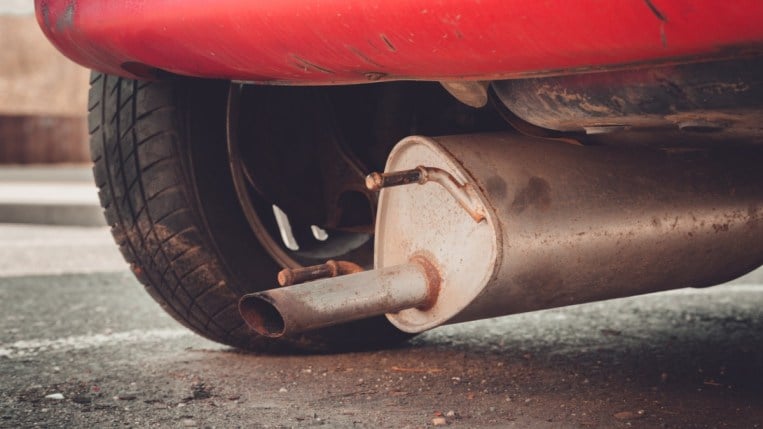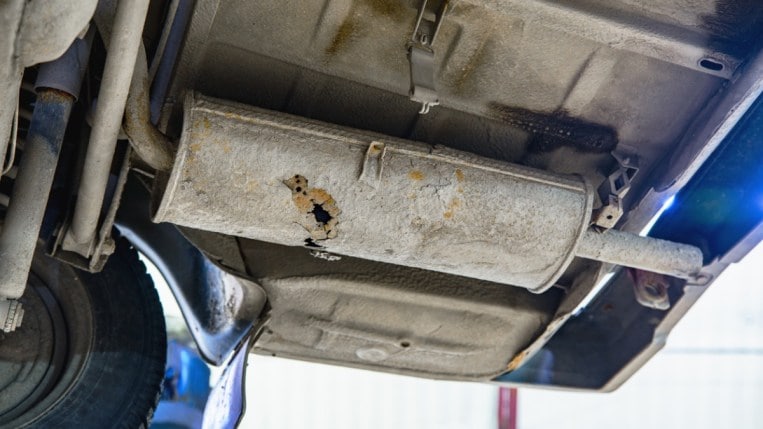Quick Facts About Mufflers
- A muffler’s main function is to reduce engine noise; if it sounds louder than normal, it indicates muffler problems.
- Regular muffler inspection helps prevent more serious exhaust system issues and potential engine damage.
- Muffler replacement is needed every five years or longer, and the job typically costs under $300.
Many drivers like cars with big engines that make a lot of noise when accelerating. However, sometimes, your vehicle being loud can be a problem, meaning something is wrong with the muffler. If your car is louder than usual or you hear weird sounds coming from beneath it, you will need to get your muffler checked.
Keep reading to know when you have a muffler problem and what to do about it.
What Is a Muffler?
A muffler is a metal canister, usually oval or cylindrical in shape, under your vehicle near the rear. Connecting the tailpipe to the exhaust pipe, the device limits how much noise is emitted from an internal combustion engine (ICE). Engines are big and powerful; without the muffler, the sound would be unbearable for most people. Reducing this noise is where the muffler comes in. It filters some excess noise from the engine and helps “muffle” it for a better driving experience.
If you start to notice that the noise from your car’s engine is louder than usual, that’s typically a sign that your muffler is going bad. There are a few other signs that you may need a new muffler.
MORE: Car Maintenance Guide: Everything You Need To Know
Signs Your Muffler Is Bad

The typical muffler’s lifespan is five years or more, and it will let you know when it has a problem. Since it works directly with the engine to reduce noise, it’s easy to know when it’s no longer performing like it should.
Listen for unusual sounds, look for visible damage or rust, observe changes in driving performance, and use an onboard diagnostics scan tool to check for engine OBD-II error codes if you suspect an exhaust flow problem.
1. The Car Sounds Louder Than Normal
This is the first sign that something may be wrong with your muffler. Its main job is to reduce the noise coming from the engine. If it is not doing that task, it’s time to take your car to a trusted auto repair shop.
Leaving this problem untreated can lead to further issues down the line and can even cause damage to the exhaust system.
2. Rattling Sound
Unlike the engine covered under the vehicle’s hood, the muffler is exposed at the bottom of the car. Since it’s not covered, it is vulnerable to impacts from rocks and debris, especially when hitting potholes, causing damage and breaks. This can cause a rattling sound, meaning that some part of the muffler or connected system has broken and has started hitting the muffler.
If something breaks and goes untreated, it can cause more damage and potentially impact other parts of the car. Go to a trusted mechanic to get a repair as soon as possible.
3. Rusted Muffler


An easy way to know if your muffler needs a repair is to check it out underneath the car. Look for your muffler attached to the exhaust pipe at the back of your car. A muffler in good condition looks free of rust with no significant dents.
“Vehicles heat up and cool down as they are driven and parked,” said Gary Hardesty, a certified master technician and Kelley Blue Book’s in-house service and maintenance expert. “Moisture and condensation are part of the combustion process. A muffler has a small hole to allow excess moisture in the muffler to drain out. Any excess moisture can rust the exhaust system when a car cannot come up to temperature.”
Washing the car’s undercarriage regularly to remove salt and parking indoors can help prevent rust from forming on the muffler.
4. Reduced Fuel Economy
The muffler connects to the exhaust pipe on the tail end of your car. When the muffler starts going bad, it will hinder how quickly exhaust can move through the pipes. The longer it takes for the exhaust to move, the worse the fuel economy gets — leading to reduced mileage.
In addition to fuel economy, the exhaust also plays a role in your car’s performance. A bad muffler can cause a reduction in acceleration as well.
MORE: Car Suspension: 10 Signs Something is Off
What to Do if Your Muffler Is Bad
If you notice any of the above signs, it is best to get your muffler inspected by a mechanic near you as soon as possible. While some muffler issues, such as a loose heat shield, can be fixed with some DIY skills, a cracked catalytic converter needs professional handling. Remember that the muffler works as part of a system to expel gasses from the engine. If an exhaust system problem is left untreated, it can cause harm to your engine.
Muffler Replacement and Repair Costs
While repair prices can vary depending on the problem or extent of the damage, get an inspection for an accurate diagnosis.
The cost to replace your muffler depends on the type of vehicle you have and labor rates in your area. Some aftermarket mufflers cost less than $100, and others have price tags more than $500. Many drivers can have a new muffler installed at an independent shop for $300 or less.
Keeping your vehicle in solid working condition keeps you safe on the road and helps you maintain the value of your car.
Bottom Line on Mufflers
A muffler reduces engine noise and typically lasts five years or more. Warning signs of muffler problems include unusual loudness, rattling sounds, visible rust, and decreased performance. When issues arise, a prompt, professional inspection is recommended, as untreated problems can cause additional damage. Muffler replacement costs vary but often run under $300 at independent shops.
Editor’s Note: This article has been updated since its initial publication.

